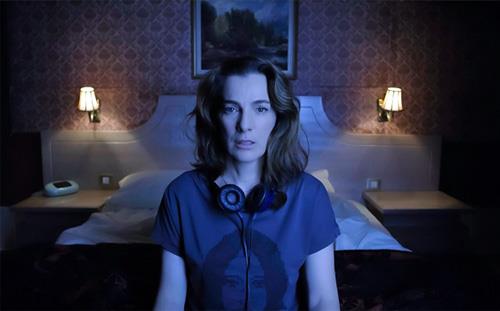
American audiences often get adapted versions of top-quality Israeli TV dramas, like Homeland or In Treatment.
With Losing Alice, which becomes available Friday on Apple TV+, we get the chance to see a new one in its original Israeli incarnation.
Losing Alice, which runs eight episodes, isn't a breezy watch. It's a dark, sometimes disturbing, psychological drama involving two female writers and filmmakers whose paths cross in a fascinating dance, sometimes affectionate, sometimes tense, and riddled with unspoken subtext about what we want from life and the price we will pay to get it.
Ayelet Zurer (top) plays Alice Ginor, who at 48 is a successful and well-known author and filmmaker. On the surface, she has one of those dream lives, married to film star David Bareket (Gal Toren) with a couple of lovely children.
But she also feels the clock ticking. Years ago, she was a cutting-edge writer and filmmaker, prominent in the cultural conversation for work that was seen as a daring exploration of female sexuality.
Since she stepped back to raise her family, she has become more like a godmother to a new generation of writers. She does some teaching, she directs commercials. There don't seem to be any significant traumas in her life, but something is missing, and both she and David sense it.
Enter a random coincidence.
On a train ride home, she is engaged in conversation by Sophie Marciano (Lihi Kornowski), a 24-year-old woman who, at first, just seems to be a fan, talking about how much she was affected and influenced by Alice's earlier work.
While their conversation spools out into more than a casual fan encounter, Alice gets off at her stop and would think little more about it except that Sophie is also a writer, and it turns out she has sent her first screenplay script to David.
When Alice gets home and brings it up, David says yes, he got the script. In fact, he emailed Alice about it two weeks earlier. She just hadn't checked her email, which is why she didn't know about it.
He says he likes it and is considering doing it. Her interest piqued, Alice prints out the script and stays up half the night reading it.
It awakens everything from which she feels like she's drifted away – inspiration, urgency, contemporary relevance. She realizes she wants to matter again.
Game on.
From this setup, Losing Alice spins a complex relationship between Alice and Sophie while exploring the impact of Alice's reawakened ambition on the other people around her, including her family.
Zurer never plays Alice as a lost soul. She has a keen sense of herself, and she understands what she's doing, both the admirable and the less admirable things.
Sophie has a different sort of self-awareness, sometimes seemingly manipulative, but also more naïve simply because she hasn't lived as long.
The bridge between them is further enriched, or complicated, by the production of Sophie's movie script, which adds its own psychological twists, many of them disturbing.
Since Losing Alice uses subtitles for American viewers, it requires paying attention. That's good. So does the story.